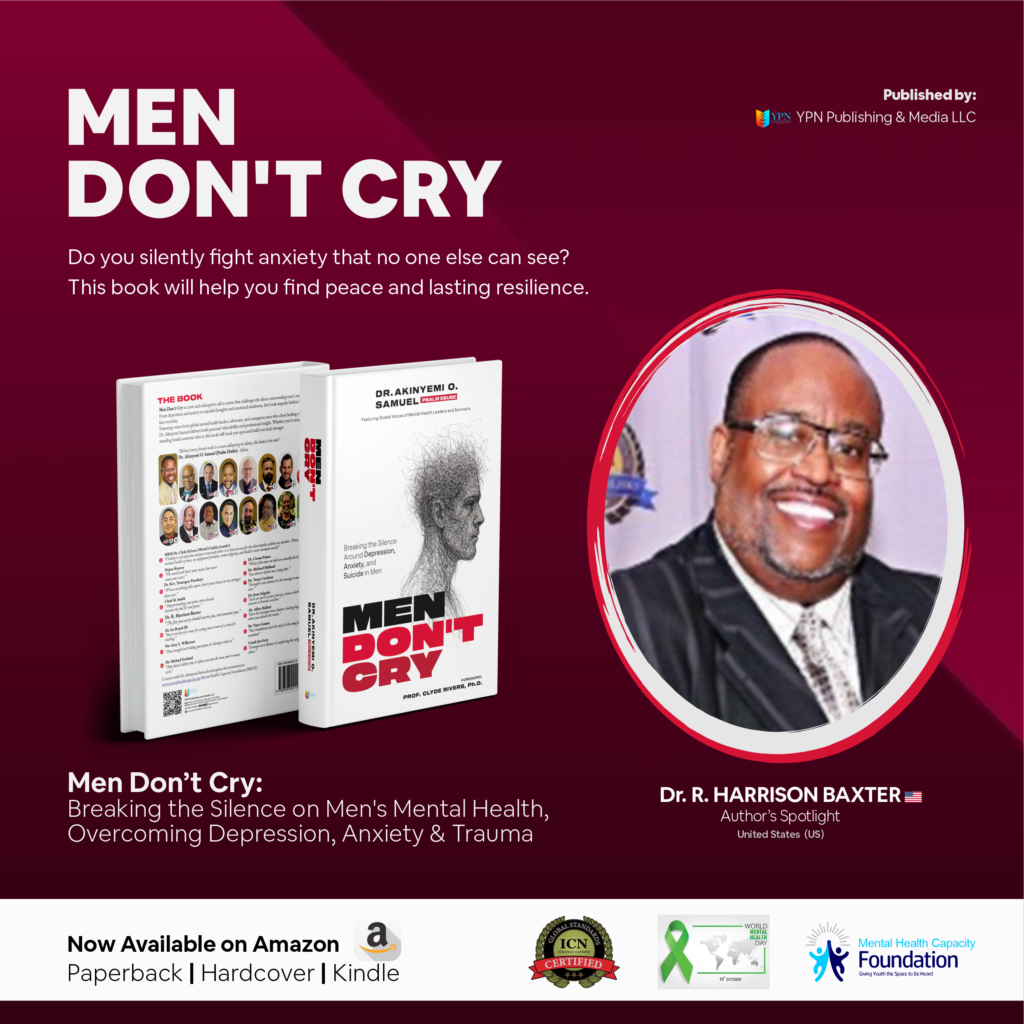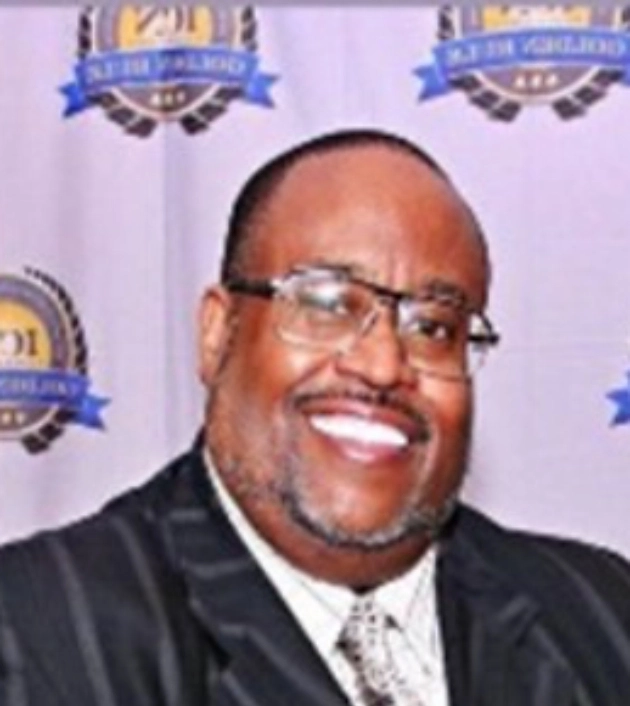Sheridan, USA October 04, 2025 Innovation Times Senior Correspondent
The fire you carry should warm you, not consume you. These words form the heartbeat of Dr. R. Harrison Baxter’s powerful chapter, When Fire Feels Like Failure, in the groundbreaking anthology Men Don’t Cry. As the world prepares to mark World Mental Health Day on October 10 under the theme Breaking the Silence: Men’s Mental Health and Access to Care in Times of Crisis, Dr. Baxter’s voice emerges as both a warning and a lifeline.
In this chapter, Dr. Baxter does not shy away from the raw reality of leadership, responsibility, and the crushing weight of expectation. He begins with a story from 1987, when he built Bronx Rebels Youth Football from the ground up. What started as a vision of hope for underserved youth became a program that demanded every ounce of his strength. On the outside, it was a success story. Championships, mentorship, discipline, and brotherhood were its visible fruits. Yet behind the highlight reels was a man unraveling under the weight of the very dream he had nurtured.
This honesty cuts to the core of what countless men experience. The fire that drives us, Baxter explains, can quickly turn into the fire that drains us. Many men understand this all too well. The passion that once motivated them to wake before dawn, to sacrifice time, money, and health, can quietly turn into a consuming blaze. Men often feel trapped between public admiration and private despair. Dr. Baxter gives that despair a voice, and in doing so, he liberates others to admit the same.
One of the most remarkable aspects of When Fire Feels Like Failure is how personal it is. Dr. Baxter recounts the difficult decision to shut down Bronx Rebels, not because the mission was unworthy, but because the man behind it was disappearing. He reveals a painful truth that resonates with many: even the most noble fires can become destructive if they are not managed. Success without balance is not success at all, but erosion.

This message is especially urgent for World Mental Health Day. Across industries, professions, and communities, men are crumbling under the weight of hidden expectations. Leaders, fathers, coaches, and professionals silently shoulder burdens until they collapse. The chapter reminds us that stepping away is not failure. Preserving one’s life, health, and sanity is the ultimate act of strength.
Dr. Baxter’s words are filled with empathy but also with challenge. He calls men to redefine how they measure themselves. Instead of equating worth with output, he asks readers to consider wholeness, rest, and peace as legitimate goals. In his own words, “The fire you carry should warm you, not consume you.” It is a mantra that every man in crisis needs to hear.
The chapter also highlights the cultural silence that keeps men locked in destructive cycles. Men are often praised for endurance, celebrated for carrying more than their share, and admired for appearing invincible. Yet what this culture fails to acknowledge is the internal collapse happening beneath the surface. Dr. Baxter dismantles this dangerous illusion by admitting that his own fire once consumed him. His courage to admit exhaustion gives men permission to do the same.
Faith and resilience are woven throughout his reflections. He frames the struggle not as an end but as an invitation to rise differently. Failure, as he shows, is often not the fire itself but the refusal to listen when the flames begin to suffocate. Men can learn to step back, to reassess, and to rebuild in healthier ways.
The stories in the chapter remind us that burnout is not confined to one sector. It can happen to athletes, pastors, business leaders, or everyday fathers. The unifying thread is responsibility without rest. Dr. Baxter warns that ignoring the signs only deepens the wound, while acknowledging struggle opens the door to healing.
The beauty of this chapter is that it does not romanticize pain, nor does it glorify endless struggle. Instead, it reframes resilience. True resilience, Dr. Baxter insists, is not about pretending the fire never hurts. It is about learning when to step back, when to seek support, and when to let go of what consumes you.
World Mental Health Day this year offers the perfect platform for this message. Men across the globe are suffering in silence, too often denying themselves access to care. With crises rising; whether financial, emotional, or social, Dr. Baxter’s story provides hope. His words align seamlessly with the theme of breaking silence, calling men to abandon the false strength of silence and embrace the real strength of seeking help.
As a mental health reporter, one cannot overstate the importance of this contribution. In “When Fire Feels Like Failure,” Dr. Baxter bridges the gap between personal testimony and universal experience. He not only shares his story but builds a mirror in which countless men can see their own struggles.
For readers, this chapter offers both recognition and remedy. Recognition, because it names the suffocating reality of carrying too much. Remedy, because it points men toward healthier rhythms, self-awareness, and a renewed definition of success.
The chapter also serves as a resource for those around men; wives, children, colleagues, and friends who often see the fire consuming but feel powerless to intervene. By reading Baxter’s story, they can better understand the inner battles men face and the importance of encouraging openness.
One of the most striking qualities of When Fire Feels Like Failure is its universality. It is not limited to a single culture or community. Across nations, men are praised for endurance and punished for vulnerability. Dr. Baxter’s chapter shatters this barrier and makes space for a new narrative where men are free to admit limits without shame.
As readers turn the final page of this chapter, they are left not with despair but with hope. Hope that failure is not the end. Hope that exhaustion can give way to renewal. Hope that stepping away can sometimes be the bravest step a man takes.
This chapter is more than a personal reflection; it is a contribution to a global movement. The anthology Men Don’t Cry brings together diverse voices to confront the stigma surrounding men’s mental health. Dr. Baxter’s chapter stands out for its honesty, its humility, and its power to transform.
For anyone navigating the fire of responsibility, “When Fire Feels Like Failure” is a must-read. It will challenge you to reconsider your relationship with success, with work, and with yourself. It will remind you that no dream is worth losing your life for, and no man should carry fire until it consumes him.
As October 10 approaches, investing in Men Don’t Cry is both timely and necessary. This book is not simply literature; it is a lifeline. Every chapter, especially Baxter’s, is an invitation to healing, restoration, and courage.
Readers can find the book in multiple formats. The convenience of the Amazon Kindle edition makes it accessible instantly. For those who value physical copies, the Paperback edition and the Hardcover edition offer the chance to hold these transformative words in hand.
Purchasing Men Don’t Cry is more than buying a book. It is choosing to participate in breaking silence, dismantling stigma, and creating a healthier future for men everywhere.

In Dr. Baxter’s own journey, we see the truth: fire can build, but it can also burn. The wisdom lies in knowing the difference. His chapter is not just a story of stepping away; it is a story of rising again with clarity, balance, and renewed purpose.
On World Mental Health Day, as voices rise across the globe to confront the crisis of men’s mental health, Dr. R. Harrison Baxter’s message will stand as a beacon. His chapter reminds us all that even when fire feels like failure, it can be the very beginning of a man’s greatest comeback.
ABOUT THE AUTHOR
Dr. R. Harrison Baxter is an award-winning corporate trainer, bestselling author, and global thought leader in Reflective Leadership and Intraflexion™, his original framework for high performance self-awareness. A PhD candidate in Performance Psychology, Dr. Baxter fuses neuroscience, reflective practice, and strategic communication to help leaders, educators, and
entrepreneurs perform with calm clarity under pressure.
He created The Listen to Lead Suite™, a system of workshops and tools for driving culture change through brain-smart leadership. His works include The Reflective Advantage and contributions to several Amazon bestsellers, with his next book, Presence Over Pressure: The Pause That Leads, releasing in September 2025.
Dr. Baxter, an international speaker and peacebuilder, has delivered keynotes worldwide, including upcoming talks in Saudi Arabia and Tokyo. Through KFAF and IChange Nations™, he advances youth and leadership initiatives across Africa. His global work earned him an honorary doctorate from UGCSI.



